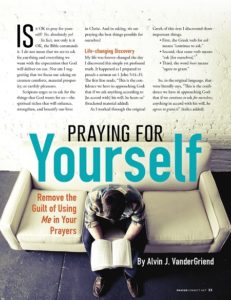Praying for Yourself
Remove the Guilt of Using Me in Your Prayers
By Alvin VanderGriend
 Is it OK to pray for yourself? Yes, absolutely yes!
Is it OK to pray for yourself? Yes, absolutely yes!
In fact, not only is it OK, the Bible commands it. I do not mean that we are to ask for anything and everything we want with the expectation that God will deliver on cue. Nor am I suggesting that we focus our asking on creature comforts, material prosperity, or earthly pleasures.
Scripture urges us to ask for the things that God wants for us—the spiritual riches that will enhance, strengthen, and beautify our lives in Christ. And in asking, we are praying the best things possible for ourselves!
Life-changing Discovery
My life was forever changed the day I discovered this simple yet profound truth. It happened as I prepared to preach a sermon on 1 John 5:14–15. The first line reads, “This is the confidence we have in approaching God: that if we ask anything according to [in accord with] his will, he hears us” (bracketed material added).
As I worked through the original Greek of this text I discovered three important things.
- First, the Greek verb for ask means “continue to ask.”
- Second, that same verb means “ask [for ourselves].”*
- Third, the word hear means “agree to grant.”
So, in the original language, that verse literally says, “This is the confidence we have in approaching God: that if we continue to ask for ourselves, anything in accord with his will, he agrees to grant it” (italics added). Wow! What a promise!
Having discovered that incredible promise, my next question was, “Lord, how can I know what is in accord with Your will?”
The answer was not long in coming. The Spirit led me to Romans 8:29, reminding me that it is God’s will for me to be conformed to the likeness of His Son.
So I did a simple thing. I prayed daily for the Father to conform me to the likeness of Christ. What happened in the following months was both wonderful and painful—wonderful because of God’s gifts of grace, painful because I had some not-so-Christlike flaws I had to deal with. Nevertheless, His answers fully confirmed His promise. God’s answers were so real and confirming that I soon began adding other requests that were “in accord with God’s will.” My first short list included three basic requests:
- Lord, make me a man of prayer.
- Lord, make me a man of the Word.
- Lord, help me to share my faith.
After praying those prayers for years, I found that prayer, Bible study, and evangelism had become the main themes of my life and ministry. Way to go, God!
Jesus Makes It about You
In the years that followed that life-changing discovery, other Scriptures came to light that confirmed His amazing promise. In the middle of the Sermon on the Mount, Jesus unabashedly commands us to pray for ourselves: “Ask and it will be given to you; seek and you will find; knock and the door will be opened to you” (Matt. 7:7, emphasis added).
In verse 11 Jesus tops off that command with a promise. Comparing His Father’s generosity with the giving patterns of earthly parents, He says, “How much more will your Father in heaven give good gifts to those who ask him!” The “good gifts” the Father gives to “ask-ers” are most certainly spiritual riches “in accord with his will.” To my surprise I found that Jesus used the same verb with the same meaning in His final comments to His disciples before He went to the cross. He said: “If you remain in me and my words remain in you, ask [for yourselves]* whatever you wish, and it will be done for you” (John 15:7). Why is that promise here?
The disciples had just heard Him say, “apart from me you can do nothing” (v. 5). That being true, their only hope for doing anything for Christ in the days ahead was to ask for and receive His help. That is also the only way that you or I will be able to do anything worthwhile for Christ. “Whether we like it or not,” said Charles H. Spurgeon, “asking is the rule of the kingdom.”
Three Results
At least three things happen when we ask and receive God’s blessings for ourselves.
First, asking cultivates gratitude. You don’t say thank you to a vending machine. You do say thank you to a generous person. Asking makes us aware of the giving Father and His generosity, and it makes us grateful to Him. If the Father simply vended His spiritual riches to us without our having to ask, I doubt that we would return thanks to Him very often.
Second, asking and receiving fosters humility. If we could live our Christian lives without God’s help, we would have reason for pride. Of course we cannot, so we have to ask. Asking and receiving spiritual riches puts us in the debt of our generous Father and moves us to give Him the credit for our spiritual well-being. Giving God the credit that He deserves is the very essence of humility.
Third, asking for spiritual riches is key to the abundant life. If we can ask for spiritual riches with absolute assurance that God will “agree to grant” those riches, there is nothing to stop us from going for the max—asking for faith, hope, love, joy, peace, grace, goodness, kindness, self-control, holiness, godliness, righteousness, faithfulness, fruitfulness, wisdom, knowledge, purity, humility, and more. The more spiritual fruit we ask for, the more we will receive. The more we receive, the more we will experience the abundant life.
But what if we don’t ask? Isn’t it possible that God will give us His riches even if we don’t ask? There is no doubt that God is gracious and, in His grace, He gives and gives and gives—sometimes even when we don’t ask. However, James, writing to impoverished believers, underscores the seriousness of not asking: “You do not have because you do not ask God” (James 4:2). Failing to ask is a grave oversight that leads inevitably to spiritual poverty.
It’s Conditional
To fully understand this remarkable promise, we also need to know that the Bible attaches at least three conditions to the promise.
1. The first condition is to ask in accord with God’s will. When our youngest son was learning to read he came into my study one day and said, “Dad, can I have a Bible?” “Why do you want a Bible, Son?” I asked.
“Because we are reading Bible stories in school and learning Bible verses in our Sunday school class,” he answered, “and I want to be able to read and mark things in my own Bible.”
I was, of course, delighted that he asked. He had his Bible within 24 hours. His request was “in accord with my will.” God delights in our asking because we are His children. His Father-heart leaps for joy when we come asking.
2. The second condition is faith. James tells us that if we ask for wisdom we will receive it (James 1:5). But then he adds, “when you ask, you must believe and not doubt.” The person who doubts, he says, “is like a wave of the sea, blown and tossed by the wind. That person should not expect to receive anything from the Lord” (James 1:6–7). In other words, when we ask for wisdom, or any other spiritual gift for that matter, we must believe that God hears our requests and will always keep His promise.
3. The third condition is a commitment to obedience. John underscores the need to obey when he says, “If our hearts do not condemn us, we have confidence before God and receive from him anything we ask, because we keep his commands and do what pleases him” (1 John 3:21–22).
If we are not obeying His commands or doing what pleases Him, we should not expect God to grant our request. If, for example, I pray, “Lord, make me a man of the Word,” but then leave my Bible unused on the shelf, I have no reason to expect God to grant that request.
He’ll Have It His Way
There is one more thing to keep in mind as we think about God’s way of answering prayer. He always answers in His own time and way. He may answer within minutes or over years. If you ask for patience, He may give you trials that teach you patience. He may give you just what you ask—or more than you ask. Solomon asked for wisdom and God answered his prayer, but then God added things Solomon had not asked for: wealth, riches, and honor (2 Chron. 1:12). God’s ways in answering our prayers may not always be our ways, but they are always the best ways.
The spiritual riches that God offers are of inestimable value. The Father in heaven is the richest being in the universe. He has it all. And He wants you and me to share in His “wealth.” He is eager to bless, eager to give, and eager to strengthen. He is listening for our prayers and watching for opportunities to give. Second Chronicles 16:9 says, “The eyes of the Lord range throughout the earth to strengthen those whose hearts are fully committed to him.” Ask-ers are among the richest persons in the world! God has made this incredible promise to us so that we may have all we need to be all He intends us to be. If we do not ask, He will be disappointed, and we will be the losers. Teresa of Avila once declared, “You pay God a great compliment by asking great things of him.”
What are you going to ask for? I hope you will go for the max.
*When a verb in the Greek is in the middle voice, as this verb is, it means that the subject is acting for himself or herself. The authors were saying that the pray-ers were “asking for themselves.”
 ALVIN J. VANDERGRIEND is the prayer-evangelism associate for Harvest Prayer Ministries. He also co-leads the Denominational Prayer Leaders Network. Alvin is the author of multiple books on prayer including Praying God’s Heart and the best-selling Love to Pray (both available at prayershop.org).
ALVIN J. VANDERGRIEND is the prayer-evangelism associate for Harvest Prayer Ministries. He also co-leads the Denominational Prayer Leaders Network. Alvin is the author of multiple books on prayer including Praying God’s Heart and the best-selling Love to Pray (both available at prayershop.org).